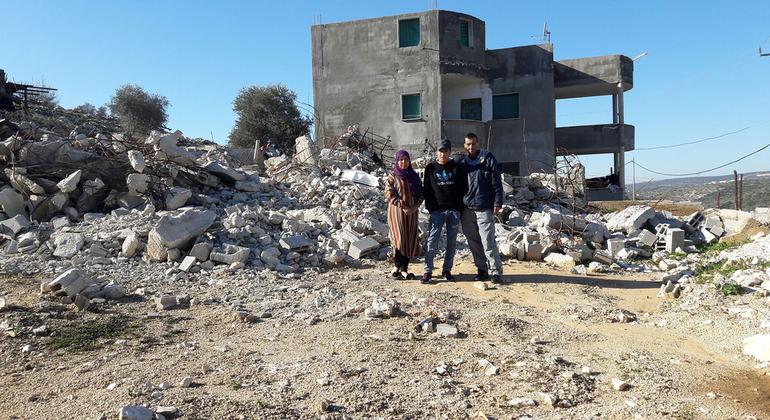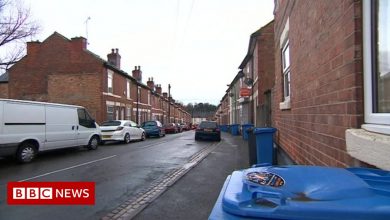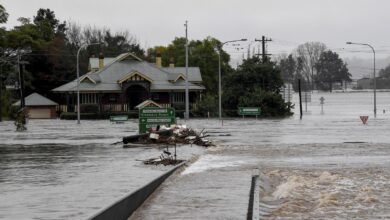West Bank attacks: UN human rights office condemns Israeli military escalation


The development comes after “at least four” Israeli Security Forces (ISF) airstrikes on the Nur Shams refugee camp in Tulkarem on Monday night that killed five people – three Palestinian men and two boys aged 13 and 15.
“Three of the dead, including two boys, were killed as they passed the targeted house. located in one of the small and cramped alleys in the camp,” OHCHR said in a statement, citing multiple sources.
The UN office warns that the situation in the occupied West Bank “could get significantly worse if the ISF continues to systematically use unlawful lethal force. and ignore the violence caused by settlers.”
The latest confirmed casualty figures from the UN human rights office show that 628 Palestinians killed in the West Bank from October 7 – the day of Hamas-led terrorist attacks in Israel that led to the war – to August 27.
“Of these, 609 Palestinians were killed by the ISF, 11 by settlers and eight by the ISF or settlers in joint attacks. However, 159 of those killed, including 29 boys and three women, died as a result of airstrikes,” OHCHR said in an update.
Condemning the “increasing military response” of Israeli forces in the West Bank, OHCHR asserted that their activities violated international humanitarian law.
“The ISF’s use of airstrikes and other military weapons and tactics violates these standards and has resulted in extrajudicial executions and other unlawful killings as well as the destruction of Palestinian homes and infrastructure,” the statement said.
Many raids, violence by settlers
Palestinians have also been targeted elsewhere in the West Bank, including on Monday night when dozens of armed Israeli settlers attacked the village of Wadi Rahal in Bethlehem.
One victim of the violence, Khalil Salem Khlawi, 37, was “shot in the back and killed” – believed to be by armed settlers or army reservists.
The OHCHR said settlers also allegedly shot and injured three other Palestinian men and prevented Palestinian ambulances from reaching the injured.
It quotes sources as saying that the ISF “stood by and watched until the man was killed, and only then dispersed the settlers, without arresting any of them.”. According to Israeli media, the ISF claimed that their reservists opened fire and hit several Palestinians.
The OHCHR stressed that the killing of Mr. Khlawi “was not an isolated incident but a direct consequence of Israel’s settlement policy in the occupied West Bank, which violates international law, with the complicity of the ISF and the prevailing lawless environment.”
Arson, assault and theft
As part of its work at the OPT, the UN human rights office documented daily attacks by settlers on Palestinians, “including settlers assaulting Palestinians, burning or destroying their property and crops, stealing sheep, preventing them from accessing their land, water and pastures, and forcing them to leave their homes and land”.
The OHCHR noted that the long-standing trend of settler attacks on Palestinians had “escalated significantly” since 7 October with support from “the highest levels” of government.
“Despite announcements of investigations, following several instances of settler violence and sporadic arrests of alleged perpetrators, No settlers have been prosecuted since October 7 for crimes related to settler violence.The United Nations human rights office noted.
According to the United Nations Office for the Coordination of Aid, OCHA, As of 7 October 2023, 259 Palestinian households (1,547 people), including 753 childrenhave been forcibly relocated in cases involving Israeli settlers.
‘People live in fear’
Ajith Sunghay, Head of OHCHR Office in the Occupied Palestinian Territory, said United Nations News The situation is getting worse.
Settler violence is becoming more organised than it was a few years ago, including the use of WhatsApp groups.
“People lived in fear,” he said. “You had a government on one side that had armed people, but they were also empowered. You had very strong support from powerful people in the government, which encouraged the settlers.”
He explained that one big difference seen in settler violence compared to a few years ago is that they are becoming more organised, including the use of WhatsApp groups and other means of communication.
“It’s not isolated incidents anymore,” he continued. “There are a lot of settlers going into Palestinian communities, whether it’s villages, towns or farms, and attacking these Palestinian herders or farmers.”
“There is a constant fear,” he said. “You have seen in the last week or 10 days, settlers coming in groups and attacking Jit villages, where people have been killed,” he said. “Unfortunately, this continues, but it has also gotten worse.”
East Jerusalem is not a holy place
In East Jerusalem, the Israeli authorities continue to apply discriminatory zoning laws and demolish Palestinian homes in violation of international law, OHCHR said.
“Thousands of Palestinians are at risk of forced displacement,” the UN office said in Silwan, citing the case of the Odeh family in Al Bustan, whose home was razed by Israeli forces on August 27, displacing 10 Palestinians, including two children.
Six other Palestinian homes have been demolished in the same area since October 7, the OHCHR said, noting that Israeli authorities had threatened to demolish the neighborhood, home to 1,550 Palestinians, to make room for a “green zone”.
In Gaza, ‘people don’t know where to go’
Meanwhile in Gaza, UN aid groups confirmed that they were continuing to deliver humanitarian aid “wherever possible and in the most difficult circumstances”, despite the chaos for civilians and aid groups caused by evacuation orders and continued Israeli military manoeuvres.
“What a disaster,” Louise Wateridge saidsenior spokesperson for UNRWAThe UN agency for Palestinian refugees, reporting from the central Gaza Strip, said Ms Wateridge on X that “pointed to a significant increase in the level of disruption and violence in recent weeks”.hundreds of thousands of people [are] forced to move every day….What we are seeing now is families, mothers, children dragging their belongings. Most people are moving on foot. Right now, there is very limited access to any kind of vehicle for this kind of movement and people just don’t know where to go“ .
Following a series of recent Israeli evacuation orders, with only 11 percent of the Gaza Strip unaffected by these measures, UNRWA officials asserted that Gazans have only “minimal” space left for shelter.There are tanks in areas that were once designated as safe zones, and this is just further proof that there is no safe place in the Gaza Strip.“




